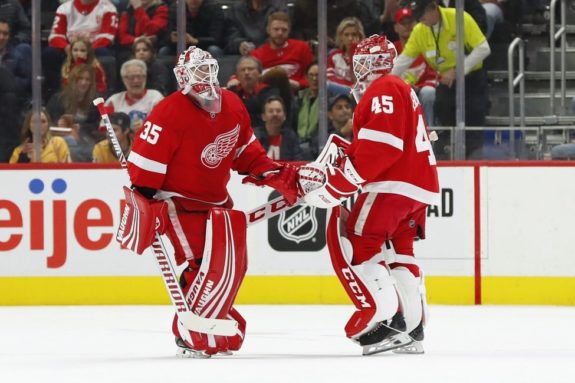Not much has gone right for the Detroit Red Wings this season. But it begs the question, are they better off at rock bottom?
This isn’t an appeal to purposely lose games whilst cruising down Woodward Avenue in a heavily armored tank. Nor is it inspired by an Alexis Lafreniere highlight reel on YouTube.
Rock bottom gives the Red Wings something concrete to build off of – a mutual purpose, which is a key differentiator of teams. Because right now, they’re more of a group than a team – a collection of individuals focused on their own tasks.
Related: Are the Red Wings Progressing?
Before the Red Wings return to contention, they need to learn how to be a high-functioning team. And having a mutual purpose is arguably the most important aspect of successful teams.
The Value of a Mutual Purpose
From an outsider’s standpoint, it’s apparent that the Red Wings don’t have a team-wide mutual goal. For other organizations like the Washington Capitals and St. Louis Blues, that mutual purpose is to win the Stanley Cup.

The Red Wings, on the other hand, are focused on rebuilding and developing. Individual players have goals to improve throughout the season so future teams can be more talented. This is not a mutual purpose that they can rally around. It’s not a source of motivation – the primary purpose of a mutual goal.
According to Forbes, “[teams are] motivated by the company mission and have quarterly or yearly goals they strive to meet. But even more importantly, each team member knows the value his personal contributions lend to the big picture. When team members focus on delivering the difference only they can create, teams become strong and successful.”
Furthermore, a mutual purpose creates individual and mutual accountability since joint contributions come from all team members. “This is what makes possible performance levels greater than the sum of all the individual bests of team members. Simply stated, a team is more than the sum of its parts.” (from ‘The Discipline of Teams’ – Harvard Business Review – March/April 1993)
Related: Red Wings: Grading Steve Yzerman’s Trades So Far
While this often applies to the corporate world, it holds true for NHL teams as well. All Stanley Cup-winning teams have a mutual purpose and individual players know their role to play in achieving it. Even as a non-contender, the Red Wings should follow this strategy. But reality is that they don’t have a core goal or clearly defined division of responsibility.
The Value of Rock Bottom
“I don’t know how much further rock bottom is, but it has to be pretty close.”
Luke Glendening’s assessment was spot on after the Red Wings were trounced 6-0 by the Toronto Maple Leafs the day before Thanksgiving. Since then, the team has gone 3-11-0 – rock bottom is definitely close, evidenced further by most standings projections:
But as I mentioned above, this may not be a bad thing – and not just for the purposes of having the highest probability of drafting Lafreniere. Finishing last will be a wake up call for Jeff Blashill, Steve Yzerman, Dylan Larkin, Anthony Mantha, and the rest of Detroit’s young core. It will be a source of motivation going into the 2020-21 season: Be better than last year. There’s nothing more motivating than being the laughingstock of the league.

The value of rock bottom is to serve as the foundation for future teams – to keep building and improving from there. Each subsequent season should be better than the last.
Final Word
Let’s say the Red Wings do in fact finish last in the NHL this season. The thoughts going through Yzerman, Blashill, and Larkin’s heads over the summer should be that this should never happen again. The same goes for every other Red Wings player – the sting of being the worst team in the NHL should serve as more than enough motivation for the 2020-21 season.
Related: Worst Trades in Red Wings History
The team’s mutual goal moving forward should be to be better than dead last. Furthermore, Blashill—or whoever is coaching the Red Wings next season—should create buy in for this goal by clearly articulating a division of responsibility among the team to ensure this mutual purpose is achieved.